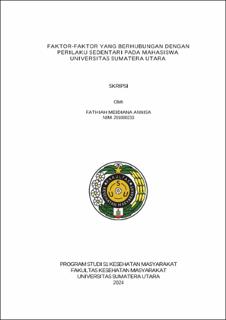| dc.description.abstract | Sedentary behavior has become a way of life for societies of all ages. Sedentary behavior is a type of activity outside of sleep with a very low-calorie output characteristic of <1.5 METs. The study aims to look at factors associated with sedentary behavior in students at the University of North Sumatera. This type of research uses a quantitative approach with cross-sectional methods. The sample technique used was table sampling with a total sample of 415 respondents. Data collection is done by distributing questionnaires through WhatsApp chat apps and QR codes. Data analysis is done with univariate and bivariate tests using chi-square statistical tests. The results of this study showed that there was no relationship of knowledge with sedentary behavior in students of the University of North Sumatera with a p-value value = 0.889, no relation of attitude with sedentary behaviour in the students of North Sumatera University with a value of p = 0.230, there was a relationship of self-efficacy with sedentary behaviours in students from the University in North Sumatera with a p-value = 0,006, there was not a relationship between social environment and sedentary behaviors in students at the University at North Sumatera with a value p = 0,609, there is no physical environment relationship with sedentary behaviour in students in the University with the p- value = 0,563, and there is a relation between exposure to social media with a simultaneous behavioral value of students at North Sumatera University, with a score of p- value = 0.005. Based on this study, students are expected to reduce sedentary behavior and start increasing physical activity in daily life | en_US |


